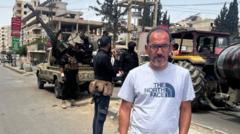On May 9, a team of seven journalists from BBC Arabic, including British, Iraqi, and Syrian members, embarked on a mission from Damascus to the southern province of Deraa, intending to investigate areas previously controlled by the Syrian regime and now occupied by Israeli forces. Their objective was to film within the UN-designated demilitarised buffer zone close to the Israeli-occupied Golan Heights.
While filming near a UN observation post in al-Rafeed, the team was approached by Israeli soldiers. Following the inquiry about their identity, they were soon confronted aggressively by four Israeli soldiers who pointed their weapons at them, demanding compliance. As tensions escalated, the team’s equipment was confiscated, and they were taken further into the buffer zone.
During their detention, the soldiers scrutinized their footage at gunpoint while questioning the team. One soldier administered a mobile phone interview with an officer who inquired about their motives for filming military positions. After prolonged tension, the journalists faced interrogation tactics that included strip searches and threats regarding their safety and future actions. The officer claimed to know personal details about the crew and warned them against any future attempts to approach the area.
After roughly seven hours detained, the team was released in a rural location approximately two kilometers outside Quneitra, only to discover their belongings tossed aside. They were left disoriented and without communication. Eventually, with guidance from locals, they managed to find their way back to Damascus, shaken but united, reflecting on the increasing peril journalists face in conflict regions such as Syria.



















